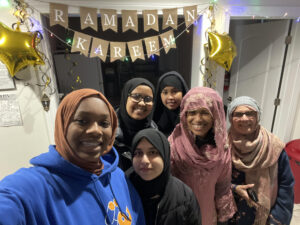Dear Smith College Faculty and Staff,
Greetings from Al Iman, Smith College’s Muslim Student Association. We are excited to announce that the Holy Month of Ramadan is approaching us in the Spring 2024 semester. The official start date depends on the moon sighting, however, it is expected that March 11, 2024 is the first day of Ramadan. We, Al Iman, as the Muslim Student Organization of Smith College deem it prominent to share the spiritual joys but also academic challenges of this blessed month.
Ramadan is the ninth month of the Islamic calendar where Muslims work on strengthening their connection to their religion by partaking in fasting, prayers, and reflection, and giving back to the community. Muslim students will be observing Ramadan through daily fasts. Fasting is done from dawn to sunset– no water or food is consumed during those times. A hidden aspect of Ramadan is the night prayers, of which many of Smith Muslims attend in Hampshire Mosque. These night prayers start at 9pm and end around 11pm (please note that time does vary throughout the month of Ramadan). In addition, the last 10 days of Ramadan require more time and commitment as Muslims usually intensify their nightly prayers to reap the blessings of this sacred time.
Many challenges arise for students observing Ramadan. Specifically, dehydration and exhaustion. Academia is rigorous and energy-consuming. Students will not be able to keep the same momentum from the beginning of the semester, so it is important to be aware of their circumstances. Considering how passionate Smithies are, many students will not let fasting affect their productivity, but it will not be easy for them. With this in mind, we would like to suggest six things that can help improve the academic experience for students observing Ramadan:
- Make your accommodations clear from the beginning of the semester and allow space for students to approach you if they require accommodations (such as, extensions and recorded lectures)
- Be flexible, patient and understanding with students. Allow for more office hours and more opportunities for students to reach out for help
- Be patient and understanding with students participating in Ramadan
- Provide opportunities for students to connect with you (late office hours are great)
- Acknowledge that energy levels will not be high – keep this in mind for student workers, researchers, and presenters and all Muslim students in general
- Provide to-go containers if events with food are hosted
Despite the physical challenges, Ramadan is a blessed month for Muslim students because it emphasizes the beauty of our religion, community, and diverse cultures. Every night is joyful, filled with generosity and love. We would also like to highlight that many Muslim students observe Ramadan in their own way and some might have personal or medical reasons for not fasting. Al Iman is hoping to have transparent conversations with staff and faculty to ensure that Muslim students are represented in the conversation. We welcome you to our first Iftar (the breaking of fast) of the month Monday March 11 at 7pm in the Helen Hills Hills Chapel Sanctuary. Faculty, administrators, and staff are highly encouraged to attend, and to bring their questions and perspectives for an open discussion about Ramadan.
Thank you for your time and consideration.
Best,
Al Iman

Students attend taraweeh nightly prayers at the Hampshire Mosque in Hadley. Pictured with students are Kim Alston, Muslim Student Advisor and Naz Muhammad, Community Relations Coordinator at the mosque.
